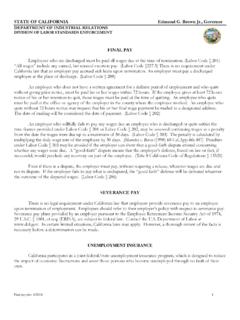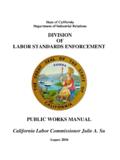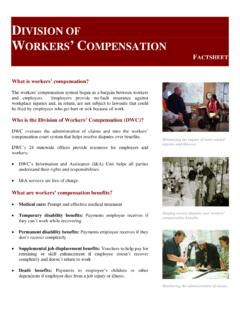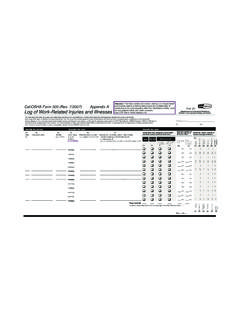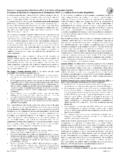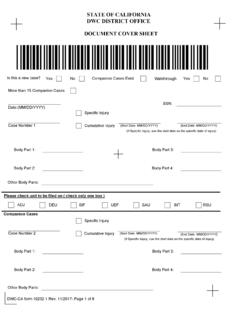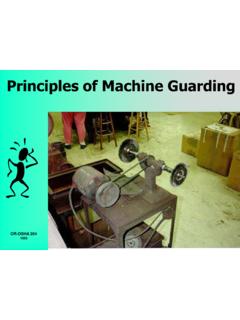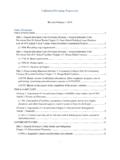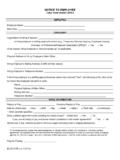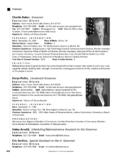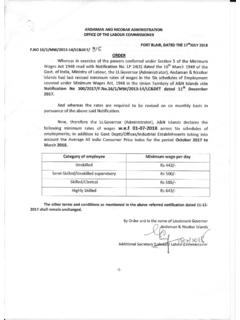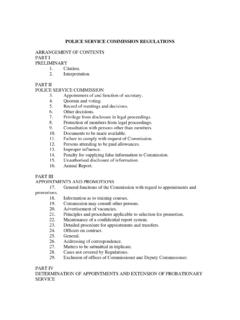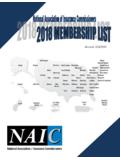Transcription of STATE OF CALIFORNIA Edmund G. Brown Jr., Governor
1 STATE OF CALIFORNIA Edmund G. Brown Jr., Governor DEPARTMENT OF INDUSTRIAL RELATIONS DIVISION OF LABOR STANDARDS ENFORCEMENT Wages (rev. 1/2011) 1 WAGES Wages are defined to include all amounts for labor performed by employees of every description, whether the amount is fixed or ascertained by the standard of time, task, piece, commission basis, or other method of calculation. Wages can be paid based on any hourly rate, salary, commission or piece rate. (Labor Code 200) COMMISSIONS STATE law allows employers to compensate employees, in whole or in part, on a commission basis. (Labor Code 200) To qualify as commission wages, the employee must be involved in selling a product or service and the commission earnings must be a percentage of the price of the service or product sold.
2 (Labor Code ; Keys Motors, Inc., v. DLSE (1988) 197 3d 557) Draws against commissions to be earned at a later date are legal only if the draw is equal to at least the minimum wage due the employee for all hours worked in each pay period. The draw may be reconciled against earned commissions at an agreed date or when the commission is earned if there is an express agreement to that effect between the employer and the employee. If no express agreement exists, the draw will be considered the basic wage in lieu of salary and fix the employee s minimum compensation. (Agnew v. Cameron (1967) 247 619) In general, once commissions have been earned they cannot be forfeited. (Dana Perfumes v. Mullica (9th Cir. 1959 268 936) However, whether commissions have been earned or forfeited is based on contract interpretation and must be determined on a case-by-case basis.)
3 No commissions will be found to be owed an employee where a contract provides that the employee is to receive no commission on accounts where payment is not received until a set number of days (as an example, 30 days) after separation of employment. (American Software, Inc., v. Ali (1996) 46 1386) On the other hand, commissions may be found to have been earned and payable to the employee after separation of employment where the contract terms are overly harsh and the employee lacked meaningful choice in the contract negotiations. (Ellis v. McKinnon Broadcasting Co. (1993) 18 1796) Upon termination of employment, an employer must pay the employee at the time of termination all commission wages earned that can be reasonably calculated at the time of termination. (Labor Code 201) Where an employee voluntarily quits his or her employment without advance notice, all commission wages that can be reasonably calculated at the time must be paid to the employee within 72 hours of termination of the employment relationship.
4 (Labor Code 202) Wages (rev. 1/2011) 2 BONUSES A bonus is performance-based compensation to be paid to an employee in addition to the employee's regular salary. (Duffy Brothers v. Bing & Bing (1939) 217 10, 215, 755) In general, an employee who voluntarily quits his or her employment before the payout date of the bonus is not entitled to receive the bonus. (Lucian v. All STATE Trucking (1981) 116 972) Bonuses constitute additional salary, and thus, must be paid in accordance with Labor Code 201 and 202 when an employee is terminated or voluntarily quits his or her employment. PIECE RATE Piece rate or piecework is defined as work paid for according to a set rate per unit. Webster s Collegiate Dictionary. A piece rate must be based upon an ascertainable figure paid for completing a particular task or making a particular piece of goods.
5 The piece rate earned must equal or exceed the STATE s minimum wage rate for all hours worked. (See appropriate IWC Order and Minimum Wage Order) REPORTING TO WORK PAY When an employee reports to work at his or her regularly scheduled time, but the employer finds it necessary to send the employee home because there is no work, the employee must be paid for at least half of the hours scheduled to work, but in no case, less than 2 hours nor more than 4 hours at the employee s regular rate of pay. If an employee reports for work a second time in any one workday and is furnished less than 2 hours of work, the employee shall be paid for 2 hours at the employee s regular rate of pay. These reporting pay requirements do not apply when: (1) the work is interrupted due to an Act of God or other cause not within the employer s control; (2) operations of the employer s business cannot commence or continue due to threats to employees or property or upon advice of civil authorities; or (3) public utilities fail.
6 (Industrial Welfare Commission Orders, 5) CALL BACK and STAND BY TIME An employer is obligated to pay the wages of an hourly employee for all time that the employee is under the control of the employer, and includes all the time the employee is suffered or permitted to work, whether or not required to do so. In Section 2 of Industrial Welfare Commission Orders 4 and 5, there is a modified definition of hours worked for employees in the health care industry. On-call or standby time at the work site is considered hours worked for which the employee must be compensated even if the employee does nothing but wait for something to happen. [A] n employer, if he chooses, may hire a man to do nothing or to do nothing but wait for something to happen. Refraining from other activities often is a factor of instant readiness to serve, and idleness plays a part in all employment in a stand-by capacity.
7 (Armour & Co. v. Wantock (1944) 323 126) Examples of compensable work time include, but are not limited to, meal periods and sleep periods during which times the employees are subject to the employer s control. (See Bono Enterprises v. Labor Commissioner (1995) 32 968 and Aguilar v. Association For Retarded Citizens (1991) 234 21) Whether on-call or standby time off the work site is considered compensable must be determined by looking at the restrictions placed on the employee. A variety of factors are considered in determining whether the employer-imposed restrictions turn the on-call time into compensable hours worked. These factors, set Wages (rev. 1/2011) 3 out in a federal case, Berry v. County of Sonoma (1994) 30 1174, include whether there are excessive geographic restrictions on the employee s movements; whether the frequency of calls is unduly restrictive; whether a fixed time limit for response is unduly restrictive; whether the on-call employee can easily trade his or her on-call responsibilities with another employee; and whether and to what extent the employee engages in personal activities during on-call periods.
8 TRAVEL TIME Travel time is considered compensable work hours where the employer requires its employees to meet at a designated place, use the employer s transportation to and from the work site and prohibits employees from using their own transportation. (Morillion v. Royal Packing Co. (2000) 22 575) Compulsory travel time longer than the employee's normal commute is considered compensable time. Travel time to a job site within reasonable proximity of the employee's regular work site is not compensable. If an employee has no regular job site, travel time to the new job site each day is not compensable. If an employee has a temporary work location change, the employee must be compensated for any additional time required to travel to the new job site in excess of the employee's normal commute time. The definition of hours worked is found in the Industrial Welfare Commission Orders and means the time during which the employee is subject to the control of an employer, and includes all the time the employee is suffered or permitted to work, whether or not required to do so.
9 STATE law does not distinguish between hours worked during the "normal" working hours or hours worked outside "normal" working hours, nor does it distinguish between hours worked in connection with an overnight out-of-town assignment. Under STATE law, if an employer requires an employee to attend an out-of-town business meeting, training session, or any other event, the employer cannot disclaim an obligation to pay for the employee's time in getting to and from the location of that event. Time spent driving, or as a passenger on an airplane, train, bus, taxi cab or car, or other mode of transportation, in traveling to and from this out-of-town event, and time spent waiting to purchase a ticket, check baggage, or get on board is, under such circumstances, time spent carrying out the employer's directives, and thus, can only be characterized as time in which the employee is subject to the employer's control.
10 On the other hand, time spent taking a break from travel in order to eat a meal, sleep or engage in purely personal pursuits not connected with traveling or making necessary travel connections (such as, for example, spending an extra day in a city before the start or following the conclusion of a conference to sightsee), is not compensable. The rate at which the travel must be paid depends upon the nature of the compensation agreement. If the employee has agreed to pay a fixed hourly rate of pay for any work performed, then travel time must be paid at that regular hourly rate, or if applicable, the required overtime rate. An employer may establish a separate rate of pay for travel before the work is performed for hourly employees, provided the rate does not fall below the statutory minimum wage. Salary non-exempt employees must be paid at the appropriate overtime rate for any hours worked in excess of 8 in a day or 40 in a week, computed by converting the weekly salary to an hourly rate.
